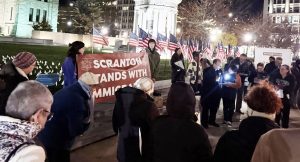SCRANTON – On the feast of the patron saint of immigrants – and a day after the U.S. Catholic Bishops issued a special pastoral message on immigration – a coalition of Catholic organizations held a second wave of prayer vigils across the country Nov. 13 for what organizers called a “national day of public witness for our immigrant brothers and sisters.”
The latest vigils – which took place on the feast of Saint Frances Xavier Cabrini, an Italian immigrant whose ministry to fellow immigrants ultimately led to her canonization as the first American saint – came amid growing concern from various faith communities and the U.S. Conference of Catholic Bishops about the impact of hardline immigration policies.

The first round of “One Church, One Family: Catholic Public Witness for Immigrants” vigils took place in multiple locations around the country on Oct. 22.
In Scranton, the Nov. 13 witness began with a 4:30 p.m. Mass at The University of Scranton’s Madonna della Strada Chapel, celebrated by university president Rev. Joseph G. Marina, S.J. Following Mass, participants processed by candlelight – a challenge with gusty November wind – from the university campus down Monroe Avenue to Courthouse Square in downtown Scranton, where they concluded the evening with prayer, song, and personal testimony.
Organizers stressed that the gathering was not a political rally but a public expression of Catholic teaching on human dignity and solidarity.
“We are here tonight to bear witness to what is going on with our community, particularly with immigrants,” Joe Mahoney, Chief Executive Officer of Catholic Social Services, explained. “We find some of the actions of the government dehumanizing – and that is not what Christians are about.”
On Courthouse Square, speakers read the U.S. Bishops’ new pastoral message on immigration and shared quotes from popes and other Church leaders.
Mahoney recalled the words of President Abraham Lincoln at the end of the Civil War – “malice toward none, charity for all” – and urged those gathered to reject rhetoric that demonizes people because of where they come from.
“Why do we have to say that these folks are evil because they came from some other place?” he asked. “Most of our ancestors did the same. This is not a political issue. This comes right back to the Gospel.”
Dr. William Cohen, a professor of theology at The University of Scranton who directs the school’s Peace and Justice Studies program and coordinates “Christians for the Common Good,” said many residents have been personally affected by recent immigration enforcement actions.
“There are a lot of people in Scranton and the surrounding area that are really moved with pain and with concern about their neighbors, their friends, their children’s friends, who are being ripped from their community,” Cohen said.
He noted that many of those caught up in enforcement efforts have been working, paying taxes, and doing no harm.
“While we recognize the need for an immigration policy that is orderly, we recognize that the kinds of actions that have been happening locally are not upholding the dignity of people,” he continued. “All Catholics and people of goodwill should agree that every human being has dignity.”
Julie Schumacher Cohen, Assistant Vice President for Community Engagement and Governmental Affairs at The University of Scranton, said the vigil was rooted in Catholic moral teaching, not partisanship.
“Upholding human dignity is one of the core teachings that we’re taught in the Catholic church. We’re in a critical time when we’re seeing the devaluing of human lives – of our immigrant and refugee brothers and sisters – and we have to stand against that,” she said.
Scranton’s longstanding connection to Mother Cabrini and to immigrant communities was also highlighted.
“This is a community that has been home to immigrants since its founding,” Schumacher Cohen added. “Mother Cabrini actually came to Scranton in 1899. She came here six times, and she started a convent and a school. I think if she was alive today, she would probably be very much appalled at what is happening in terms of the closing of borders to refugees and the policies of mass deportation.”
For participants, the evening was a chance both to pray and to be seen.
“As Catholics, it’s important for us to voice our concerns for what is going on, because we could be next,” Anthony Farah, a parishioner of Saint Robert Bellarmine Parish in Wilkes-Barre, said. “It is good to see that there are people that care about these issues in our community.”
